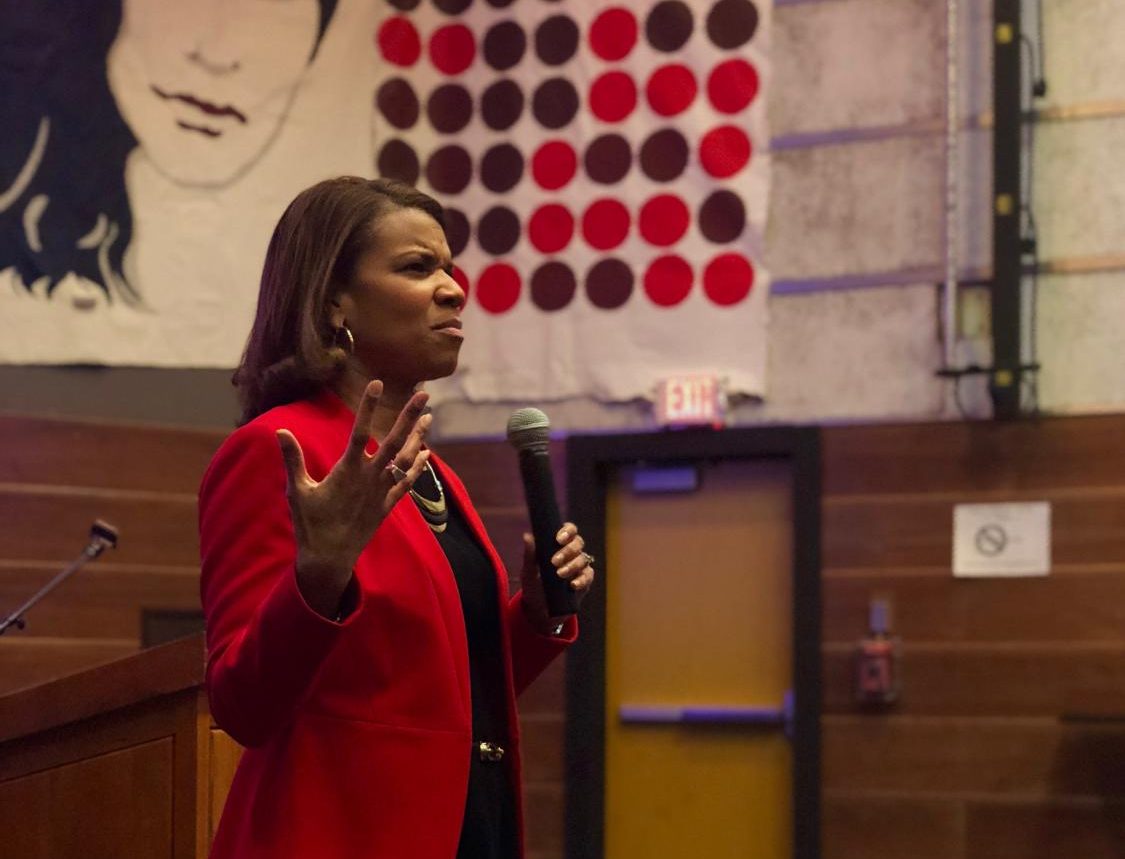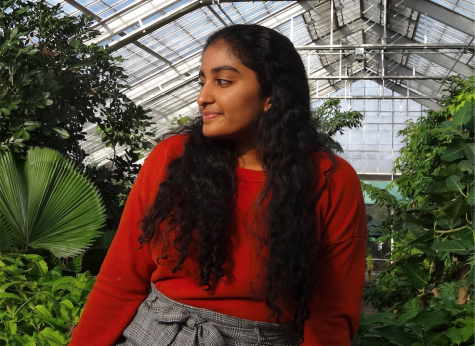
Kemba Smith Pradia: her journey, her impact
May 5, 2019
On March 19, 2019, adults and students trickled into Pioneer High School’s Little Theater. Huron Choir Ensemble filed onto the stage in matching t-shirts and sang “Lift Every Voice and Sing” by J. Rosamond Johnson followed by a reading, “Who Said It Was Simple” by Audre Lorde, read by some Skyline High School students. They set the stage for Kemba Smith Pradia: a national motivational speaker, author and criminal justice advocate.
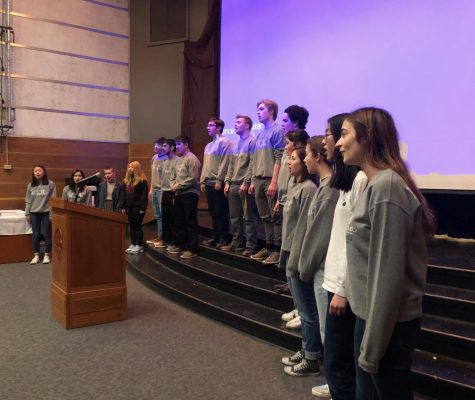
Pradia kicked off the event with a brief video, which led into her lecture. From the very beginning, she held the room’s attention as she spoke in her red suit about her compelling story. However, she hoped to see more young people in the audience.
“I believe whoever was supposed to be in the building was in the building,” Pradia said. “No matter how small or big.”
As Pradia does these events and lectures across the country, she wants to make the most impact on young minds through sharing her journey — from her imprisonment for crack cocaine possession to her criminal justice advocacy. And she feels that she does.
“The events, in general, make me feel like a discussion has been initiated that things have been sparked in young people’s minds in wanting to be a part of change,” Pradia said. “It always brings my heart joy to see young people critically thinking about some of these [criminal justice] issues and the need for change.”
But before all of this advocacy, Pradia’s life was dramatically different.
Pradia grew up in Richmond, Virginia as an only child. After graduating from high school, she attended Hampton University, a historically black college, only to go through a series of unfortunate events.
While at Hampton, Pradia was involved in a relationship with a major drug dealer for around three and a half years. He abused her mentally and physically, but she kept on thinking, “Maybe I can change him.” However, at the time, she couldn’t recognize these red flags. This relationship eventually led to her 24.5-year federal prison sentence for crack cocaine possession, as a first-time offender, while she was pregnant. She realized the wrongs she committed, but felt it didn’t warrant that sentence.
During her imprisonment, she was cuffed in a hospital with security that restricted her parents to enter at first; this is where Pradia gave birth. It took the convincing of a hospital worker to allow her parents to be beside her. Once she gave birth, she was never given a chance to hold her baby boy. Instead, he was given to her parents who raised him while she continued her prison sentence.
Pradia would dream of getting out of prison sooner. She felt that what happened to her shouldn’t happen to anyone else, so she began sharing her story and fighting for what she believed in while she was behind bars. During this process, there was a time when she was fearful of being judged for sharing her story. But that didn’t stop her. She promised to herself to continue being a voice for all those that she left behind in prison.
“I left behind many Kemba Smith’s in prison,” Pradia said during the lecture.
She noticed that her past mistakes were mostly because of her lack of self-love. Throughout the lecture, she mentioned how she would have never chosen that abusive relationship; she felt that as a person she could have been stronger if only she chose to love herself first.
“I had to learn through experience, and over time I began to love myself the way that I needed to,” Pradia said.
In December 2000, Pradia’s sentence was commuted to time served, reducing the sentence to the amount of time spent in prison awaiting the trial, by President Bill Clinton after serving 6.5 years.
Later, Pradia graduated from Virginia Union University with a bachelor’s degree in social work. She has been a member of the Virginia Criminal Sentencing Commission for the past three years and uses her voice to advocate for various criminal justice issues by sharing her story throughout the country.
Community High School senior, Leah Fleming, attended the event on a whim and did not regret going. When Pradia mentioned that she stayed in that abusive relationship because she wanted to change him, Fleming noticed how all the women in the audience resonated with that feeling.
“You want to be the person to open up his world and all, but you matter more than he does,” Fleming said.
By putting a face to these criminal justice issues, Pradia hopes people would care more and become more involved in these issues.
“I want them [the audience] to walk away with knowing that we each have a responsibility,” Pradia said. “That responsibility is to be conscious. Conscious of what’s going on within our criminal justice system and seeing where, as individuals, we can each make a difference and make a change.”
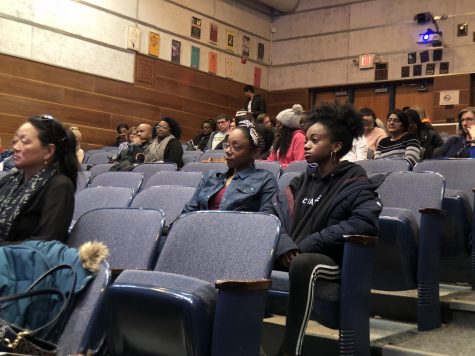
And it seems that Pradia achieved this goal in Ann Arbor because Fleming walked away knowing that she could be more involved in these issues and an active member in her community by going to events like Pradia’s.
“You don’t have to be an activist to be involved,” Fleming said.
During the event, Fleming noticed that there weren’t many men at the event, and she believes that is an issue. A majority of the audience was black women, there were a handful of white women, and then there was everyone else. She feels that lectures like Pradia’s need to be attended by more men.
“Step one, learn,” Fleming said. “Learn what’s happening, what’s going on. And then you can try to move onto step two, which is actually doing something about it.”
It was in Cindy Haidu-Banks’ and Janelle Johnson’s social justice class when the way Fleming saw things changed forever. Flipping through the pages of the “The New Jim Crow: Mass Incarceration in the Age of Colorblindness” by Michelle Alexander, Fleming noticed a veil being ripped away. She began understanding all the horrible things that have been happening in the prison-industrial complex.
“They’re human beings, some of which have made bad mistakes and all, but they deserve a second chance,” Fleming said. “They deserve to be treated with dignity and respect, and I think that’s something we should be working more towards.”
Fleming was disturbed to hear the political aspects of mass incarceration, especially, pregnant women in prison who are forced to give birth in shackles only to have their child taken away from them.
“That’s inhumane,” Fleming said.
The impact that Pradia’s past experiences have had on her is visible the moment you meet her. The strength and resilience she exudes are undeniable. Moreover, through those experiences, she realized how strong and resilient women are — black women especially — and decided to educate herself on the systems that are in place in America.
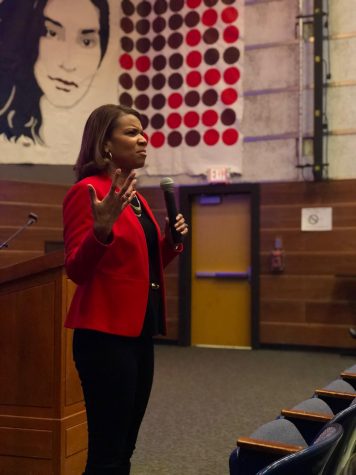
“I wanted to continue carrying the torch of our legacy and fighting for change,” Pradia said.
However, revisiting her past was difficult, and so to make the process of writing “Poster Child: The Kemba Smith Story” more tolerable, Pradia used a ghostwriter, a hired writer who isn’t credited. Pradia values the power of the pen, and she encourages student writers and journalists to use their ability to write people’s stories.
“I’m not proud of the choices, but I am proud of knowing what kind of impact that story [Poster Child] could have on other people,” Pradia said.
Currently, Pradia has been empowering women to join STEM fields as well as opening up a home for women to help them transition into society after coming out of prison. Along with these projects, she still has plans to share her story with young people to hopefully spark a change. As a current member of Virginia American Civil Liberties Union, she will soon be their state advocacy campaigns director.
“It’s my hope to make some change revolved around the criminal justice and equity within the state of Virginia and garner the additional skills that can help me navigate the political scene,” Pradia said.
If Pradia could travel back in time and tell one thing to her past 19-year-old self, when she started at Hampton University, it would be to focus on self-love.
“Don’t focus on what you see now,” Pradia said. “Love yourself and love your goals enough to stay focused on your future and where you want to go in life. And don’t let anything distract you from that.”


